China – Late Term Forced Abortion Victim Speaks Out for International Women’s Day
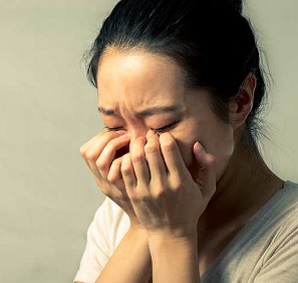
March 8 is International Women’s Day. Women’s Rights Without Frontiers presents the heartwrenching testimony of Yue Zhang, who suffered a late-term forced abortion under China’s One Child Policy in 2013, because she was unmarried. It remains illegal under China’s Two Child Policy for unmarried women to give birth. We give special thanks to Women’s Rights in China for connecting us with Ms. Zhang, and to The Heritage Foundation for hosting an event to shine a light on continuing coercion under China’s Two-Child Policy.
Here is the full testimony of Yue Zhang, a young woman of remarkable courage:
Among Forced Abortion Victims, I Am Not the Last One
Author: Yue Zhang, March 2017
My name is Yue Zhang, I was born in Nanjing City in China’s Jiangsu Province in 1985. First, I would like to thank Women’s Rights Without Frontiers (WRWF) for inviting me to speak, and the introduction from Women’s Rights in China (WRIC). I would also like to thank The Heritage Foundation for giving me the opportunity to stand here and tell my tragic experience of forced abortion by Chinese health and family planning officials. It used to be a memory that I was most reluctant to look back at, and even regarded it as extremely shameful. But today I understand that the victim must be brave enough to stand up and tell the truth, and show the world that the Chinese Communist Party’s family planning policy continues to murder, fine and persecute women. Even though the Chinese Communists have modified the policy, the act of harming the women and destroying lives is still continuing to happen.
At the end of August, 2013, I felt nauseous and uncomfortable. I thought I was sick and went to the hospital for a check-up. The doctor told me that I was pregnant. Upon hearing this news, I at first felt surprised and happy — I was at the proper age and always had dreamed of becoming a mother. Every time I saw friends and classmates together with their child, I admired them and wanted to have a child of my own. After the initial excitement, I was also felt worried and frustrated, because I was not married. Moreover, I had separated from my boyfriend before I found out I was pregnant. In China, it is against the family planning policy for unmarried women to give birth to their child. I was worried for the future of my child, worried that he or she couldn’t obtain Hukou (household registration). A child without Hukou is unable to go to school, unable to receive education, and unable to have the rights to get various vaccinations in hospital. That child will also have many difficulties building family and career in the future. Although I had these concerns, my right to become a mother and my desire to protect lives allowed me to continue the pregnancy of my child. I felt happy every time the little baby moved in my womb.
Around 5 months into my pregnancy, the government’s Family Planning Committee found that [that I was pregnant]. One day the neighborhood Committee waited outside my house along with Family Planning Officials. In the beginning they were beat around the bush, but pretty soon they disclosed the real purpose of the visit: to persuade me that, in my situation, I had to either perform abortion or pay a large “social maintenance fee.” After that, they left my house to let me think through my options.
I decided to continue my pregnancy with this child.
One day in early March in 2014, when I was six months pregnant, our community street Family Planning Officials suddenly broke into my house, telling me my two only options: First is forced abortion, Second is paying the social maintenance fee. Otherwise, if the child is born, without Hukou, he will not be able to do anything. They also threatened to inform the bank to confiscate my house, telling my employer to fire me and leave me unemployed. I felt anguish — I couldn’t choose either option.
After the officials left, I immediately inquired about the Family Planning Policy and Social Maintenance Fee policy of Jiangsu Province. I learned that with my annual income level, in order for my child to get Hukou, I needed to pay over sixty thousand US dollars of “Social Maintenance Fee,”or penalty. After paying the penalty, one could get the Hukou with the receipt [of the penalty fee] at the local police station. I simply couldn’t afford this huge cost. According to the “Jiangsu Province Population and Family Planning Ordinance” Chapter 6, Article 41, specific standards [setting the amount of the social maintenance fee], “for those who give birth outside of wedlock, the first child will be charged for 0.5 times to 2 times of the amount of the basic standard of Social Maintenance Fee. The urban residents’ basic standard is the previous year’s average annual income of the county where the individual lives. For those whose annual income is more than twice of the average urban or rural residents’ annual income, in addition to the fee mentioned in Paragraph 3 of this article, the individual shall be charged a fee of the equivalent of one or two times of the extra portion of the individual’s annual income.” In 2013, the average income for Nanjing City’s residents was 39,881 Yuan.
Unfortunately, 2013 was the year in which I had the highest annual income since I started working. That year the market conditions were favorable and my sales number was high, therefore I had the highest bonus amount. With my annual income of approximately thirty thousand US dollars, I would have to pay an equivalent of sixty thousand US dollars of social maintenance fee. But this is not an annual thing [that I got such a high income]. Moreover, I had already consumed most of the money that I earned and sometimes I even had to borrow money from bank to pay for some larger costs during daily life.
But I never wanted to give up on an innocent little life. My mother also could not bear to see this happening. My poor mom asked around for help and information. She finally told me that, by the time I would give birth, we could bribe the doctor to help with the birth, and we could request a favor from the local police officers and get Hukou by paying some money.
Finally, in mid-March of 2014, a group of six to seven people from the Family Planning Committee forced their way into my house. They sent two people to watch my house, and four others to drag and pull me into a car waiting at my door for a while. My helpless mother also followed me in the car to the hospital.
In the hospital, on the same afternoon, the doctor injected a need of oxytocin into my abdomen. I was trembling. I kept shouting and struggling. The doctor left after the needle injection. After a few hours of stomach pain, I started to see blood and liquid flow. In the evening, I had strong stomach pain, and after another few hours, I first saw the water capsule, and then the child came out. I dared not open my eyes to see [the child]. A lively, fresh life just silently got destroyed like this.
I cried and roared. Doctors and nurses took away the little life. I wanted to beg them to leave it with me, but I couldn’t speak. Afterwards, the doctor gave me another shot, saying that it was to stop the pain, but the pain did not stop. When they performed the operation to clean my womb, it was so unbelievably painful. Lying on that bed, I felt my body was cut open and broken.
I kept crying. The child was still so small — didn’t open the eyes and have a chance to come to this world and call me “Mom,” didn’t even make a sound of crying, and just get deprived of life by the government.
My mind and body suffered great harm, but my boyfriend who was in love with me for many years didn’t even come to look at me and give my any comfort.
For a long time, I always had nightmares. I dreamed of lying on the operating table. My stomach was cut open. I was dead in the dream, with a large pool of blood on the ground, and all kinds of internal organs lying on the ground. Sometimes I dreamed of my child, a small life lying in a pool of blood, asking me why I didn’t want him …
In the traditional Chinese culture and the backward ideas, this experience would be considered very shameful. Pregnancy outside of wedlock not only violated the country’s law, but also indicated that I was not a decent girl. Some people even describe the womb of people like me as the“house where people have died, meaning, who would want to live in a house where people had died? These people believe that it would be unlucky to marry someone like me and it would be hard to gt pregnant. Therefore, I dared not tell anyone. I was having hallucinations and for awhile always seem to hear children crying around me. Sometimes I believed it was my fault. I hated myself for getting pregnant without getting married, and causing my child to die. Physical and psychological pain for a while has made me want to stop living this life.
Here I would like to thank my mother. She accompanied me through the most desperate days. She tried many ways to enlighten and comfort me, encouraging me to travel and study. With my mother’s encouragement and help, in December of 2014 I came to the United States. As a stranger in this country, I felt the culture of an open society. I felt the air of freedom, democracy and human rights. All this gave me the courage to sail on with my life. In May of 2015, I applied into a Language school in New York City, to enhance my English communication skills.
I remember that, soon after I went to the language school, once we discussed the family and marriage in class, a classmate asked me “I heard that in China, you can’t have multiple children, is this true?” After listening to my explanation of the Chinese Family Planning policy, they all were surprised, and directly told me that, “if the government dared to tell me how many children I could have, or did not allow my child to be born, I would use a gun.” It was at that time, I realized that this was not my fault. In fact my child also had the right to come into this world. On the contrary, it was the Chinese government’s fault. China’s Family Planning Policy persecuted me and violated my legal rights.
Reading some online articles from the Women’s Rights in China (WRIC) Chinese website about Chinese family planning, I was very much enlightened. In December of 2015, I took the initiative to join the volunteer team of Chinese women’s rights. During the interaction with other volunteers, what I learned and heard completely changed my view from my education in China. I saw things that I couldn’t see in China. I learned that it is a basic human right to give birth to child, and forced abortion is an inhumane action of murder. I also learned about how to make my voice heard for myself and for others’ rights. Most importantly, I realized that all of this is not my fault, but is because of the serious human rights violations by the Chinese government for a long time. It is not us who should feel ashamed. It is the government that represents Chinese Communist Party that should feel ashamed. We have to stand up when our legal rights are violated, share our experiences, and reveal the murderous nature of the Chinese Family Planning Policy. I am here today not only for myself, but also representing millions of Chinese women, who till this day still cannot make decisions about their own body and their own womb.
In today’s China, it is not just me who suffered from the Family Planning Policy. Another forced sterilization just happened. On February 8, 2017, in Yunnan Province’s ZhaoTong City, resident Hu Zheng Gao and his ex-wife have three children. His ex-wife was forcibly sterilized for violating the Family Planning Policy, and paid a huge sum for the Social Maintenance Fee. Hu Zhenggao remarried in 2013, and his wife gave birth to another child. Surprisingly after 17 years, he got arrested by local Family Planning Officials when visiting home for Lunar New Year. They were detained till 2:00 a.m., and the local government officials threatened him with two options. The first option was to get sterilized immediately. The second option was to be jailed for 15 days together with his wife for disturbing public order. Eventually he had anesthetic medicine applied and was forced to the Family Planning Office of the township government and was performed sterilization operation. His wife remained detained in the police station where he was sterilized.
Countless bloody facts are telling us that China’s inhumane murderous family planning policy is still in progress and is continuing to persecute women and families.
The Chinese government formally adopted the Two-Child Policy on December 27, 2015, and formally implemented it on January 1, 2016. Many people believe that this will mean a fundamental change to China’s Family Planning Policy, but this is not true. After implementing the Two-Child Policy, there was not a corresponding policy regarding women’s occupation, maternity leave, healthcare or education. Using healthcare as an example, there is a serious deficiency in the number of gynecological doctors and pediatricians. According to official data from the proceedings of China’s Family Planning Committee on September 27, 2016, the mortality rates for the first half of 2016 for pregnant women and new mothers have increased by 30.6% compared with same period in 2015. In other words, the steep rise in mortality rates indicates that the lives of Chinese women are not respected or receiving enough attention, no matter whether it’s a One-Child or Two-Child policy.
The Chinese government created a wrong policy for its own interests, arbitrarily violated women’s legal rights, and deceived the Chinese people for a long time. There are millions more women, most of whom are not as lucky as I am, since I can come to the United States and access a completely different culture, access democracy and freedom. These women are still living in guilt and self blame, unaware of their legal rights. They are struggling to have one more child, suffering all kinds of persecution without being able to appeal for justice. Because of this, I choose to stand up, and I have founds that many people from China are sharing the same belief and voice as mine. I believe one day, Chinese women can really become the owners of their own bodies, control their own right to give birth, and no longer bear the burden of family planning policies. Their bodies will no longer be harmed by the government. They will live their lives with dignity.
__________________________________________________
Women’s Rights Without Frontiers is a broad-based, international coalition that opposes forced abortion and sexual slavery in China. Our immediate goal is to raise public awareness regarding the coercive enforcement of China’s One Child Policy, the connection between this coercion and human trafficking in Asia, and the other human rights abuses that arise out of this coercive enforcement.
Please click here to sign their petition or here to make a contribution to continue their fight against forced abortion!
For more information and how to get involved please visit http://www.womensrightswithoutfrontiers.org/
The views expressed by guest contributors to the “It’s a Girl” blog represent the opinion of the individual author who contributes the content and should not be interpreted as being endorsed or approved by Shadowline Films. We feature these contributions to foster dialogue and exchange on gendercide and invite our readership to join the discussion.
My Journey to Advocacy: Providing a voice for those who weren’t given one
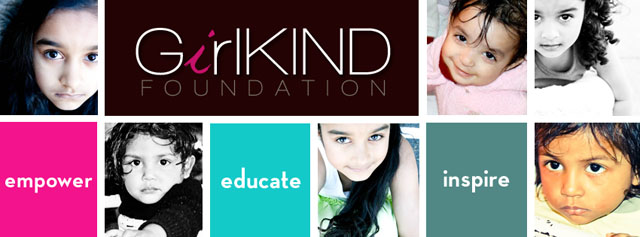
Last December I watched the trailer to “It’s A Girl,” for the first time. It broke my heart to realize what was happening in many parts of the world. I quickly began researching more about it online, the more I read, the more I began to hate this world. Girls were being abandoned in the streets left to meet their deaths just because they were born a girl. I was left feeling hopeless, sad and defeated. This issue was epic, how could I possibly make a difference? As each day passed I continued to read more and shared online the stories I read.
Throughout my discoveries, I saw a little glimmer of hope. There was a very special home in India, specifically Punjab, (where I ethnically originate from) that was doing amazing work with baby girls that were being abandoned, uncared for and unwanted by their parents.
Unique Home in India is run by a wonderful woman named Prakash Kaur, she and her assistants together help raise approximately 60 girls. She recues girls from the sides of the roads, garbage bins, fields and some leave their unwanted baby girls in the provided cradle. After speaking with the orphanage I launched my “Save A Girl,” campaign, a social media campaign to help raise awareness on this issue as well as to collect personal care items and clothing for these girls. It was a small step, but that step helped me heal on the inside.
These girls reminded me of myself and the what “ifs,” began echoing in my head, what if it was me? I was given the opportunity at a fulfilling life in a beautiful country, the very least I could do was be a voice for them.
With the help of family, friends and the community the campaign raised just under 1500 items that were hand delivered to the girls by my relatives. Since that time I continued to raise awareness and have discussions via social media on what could be done on this issue. I have yet to make my travels to India; my first trip to India is going to have so much purpose. I look forward to meeting these girls and being inspired by them to do more.
Just a few weeks ago, I established GirlKind Foundation. A non-profit organization that I feel will serve as a great platform to help bring an end to gendercide, gender discrimination and help support abandoned girls in India. The goal is to continue to raise awareness on this issue, changing cultural values is going to take time, dedication, awareness and education. Eight months ago I would of have never imagined sitting in the position I am in today. The trailer to “It’s A Girl,” inspired and motivated me to do something, to become a voice for those girls who weren’t given one. Being an advocate for social change is much easier than five years ago. There are so many social media tools that we as individuals can use to make an impact and together we can change the world. Never underestimate your abilities; one person can truly make a difference.
Our first event as GirlKind is in keeping with raising awareness on the issue and asking how we can fix this. We will be a hosting a film screening of “It’s A Girl,” on September 15 to be held in Abbotsford, BC. This evening will also mark the official launch of GirlKind, creating a better world where every girl matters. If you would like more info please visit: www.girlkind.org
 Deesh Sekhon is a wife and mother from Abbotsford, BC. She owns and operates her own photography company and is an active member of her community. Deesh has recently launched GirlKind Foundation, which is advocating and educating for change in cultural beliefs and taking a stand against Gendercide. Her belief is that we must strive daily in our lives to better our communities and make them a stronger, inclusive place for our children to live.
Deesh Sekhon is a wife and mother from Abbotsford, BC. She owns and operates her own photography company and is an active member of her community. Deesh has recently launched GirlKind Foundation, which is advocating and educating for change in cultural beliefs and taking a stand against Gendercide. Her belief is that we must strive daily in our lives to better our communities and make them a stronger, inclusive place for our children to live.
The views expressed by guest contributors to the “It’s a Girl” blog represent the opinion of the individual author who contributes the content and should not be interpreted as being endorsed or approved by Shadowline Films. We feature these contributions to foster dialogue and exchange on gendercide and invite our readership to join the discussion.
A Letter from Mitu
#IStandWithDrMituKhurana
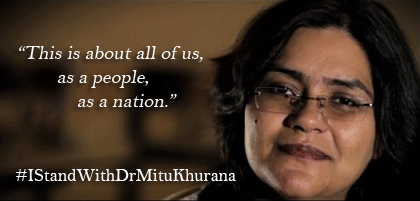
Dear Friends and Supporters,
I am a doctor/pediatrician and I have faced immense pressure from my matrimonial family to abort my twin female children. My experience in fighting for justice for my daughters show the extreme patriarchal attitude of all authorities supposed to help women like me, who want to go against their families and save their daughters.I am the first mother in India to file a complaint under the P.C-P.N.D.T Act because my husband and in laws did not want me to give birth to my twin daughters. My case* set a precedent for other women to come forward and complain when being forced to abort their own daughters. The P.C-P.N.D.T Act which was passed in 1994 was highlighted when I filed my complaints.
Despite it being found out that no Form F was filled when USG was done on me, and other incriminating evidences today after 10 years of my struggle, the trial court has discharged all the accused and dismissed the case. The orders of the court does not even mention the arguments raised by my counsel. The lower court has dismissed my P.N.D.T complaint despite all evidence.
I will however fight back, but need the support of all of you. The orders discharging the accused is a closed door for any other women who want to come forward to speak out against their accused, in their lawful obligation to protect their daughters.
If I appeal alone in the higher court, the orders will be same. This time I want all of you with me, with you extending your support in media, in social media, in talking with others, and watching over the orders as they come in. I cannot do this alone. Please share, blog, and tweet with the hashtag #IStandWithDrMituKhurana.
I want people to realize I do not get any monetary benefit from this case. I just want my daughters, our daughters, to have and to inherit a safer, better world. As sex ratios decline, our society is becoming more violent — crime in general, and crime against women in particular, is increasing.
This is not about me. This is about all women who want to save their daughters. This is about all of us, as a people, as a nation.
In Solidarity!
Dr. Mitu Khurana
*My case has been highlighted in various national and International media, some of them being-
1) First episode of SATYAMEV JAYATE
2) WITNESS program on ALJAZEERA channel (http://www.aljazeera.com/programmes/witness/2013/09/20139912536503360.html)
3) 2009 Human Rights Reports: India by US government (http://www.state.gov/j/drl/rls/hrrpt/2009/sca/136087.htm)
4) 2010 Country Reports on Human Rights Practices – India (http://www.state.gov/j/drl/rls/hrrpt/2010/sca/154480.htm)
The views expressed by guest contributors to the “It’s a Girl” blog represent the opinion of the individual author who contributes the content and should not be interpreted as being endorsed or approved by Shadowline Films. We feature these contributions to foster dialogue and exchange on gendercide and invite our readership to join the discussion.
Why Aren’t More Men Involved in Fighting Violence Against Women?– A Man’s Perspective
In a recent Huffington Post article, Soraya Chemaly said, “I’m thinking that it shouldn’t take gendercide and gang rapes of children and women to motivate good men to act against pervasive 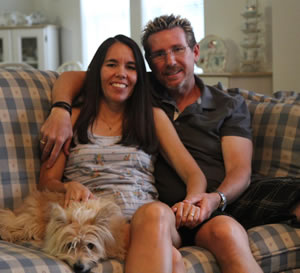 injustice that all women and girls are subjected to in one degree or another.” She goes on, “Women are not perpetrating widespread violence against one another or against men — in homes or in war. And yet, whenever I go to meetings, seminars or schools to discuss this topic, I enter rooms full of women. This is immensely frustrating.”
injustice that all women and girls are subjected to in one degree or another.” She goes on, “Women are not perpetrating widespread violence against one another or against men — in homes or in war. And yet, whenever I go to meetings, seminars or schools to discuss this topic, I enter rooms full of women. This is immensely frustrating.”
I have often been asked at film screenings by audiences of 99.9% women why so few men are involved in the movement to end violence against women. I can’t speak for other men, but my journey to becoming an VAW activist began with a life-changing experience while filming a woman sharing how she killed eight of her own newborn daughters in India, then learning about the underlying culture of misogyny that drove her to such desperate measures. I felt intense anger towards the men perpetrating this violence on women. But I also imagined my own wife and daughter (who was 11 at the time) suffering the same fate and felt anger at the thought of good men who might be in a position to defend them, but chose to stand passively by.
Previous to my life-changing experience filming It’s a Girl, I believed that loving and honoring the women in my own life was enough. But I no longer believe that. More men need to take action and add their voices to the movement. I challenge men every chance I get to not remain silent.
But I also think it must be acknowledged that many men may not become involved because the women’s empowerment movement can often feel like a hostile place for men. For instance, if men express their desire and commitment to defend women and their rights, we can be accused of suggesting that women are weak and need us to defend them. I’ve been told by feminists that men do not have a right to an opinion about issues like reproductive rights because we can never know what it is like to experience an unplanned pregnancy and need to stay out of it. The hostility towards men in general by some of the women commenters on our trailer on YouTube is almost violent. The message this sends to the majority of good men who honor and respect women is that we really can’t win in this, we are going to be lumped in with the bad men anyway, so why try.
Amazing Progress in 2012: Thank You!
 As the Shadowline Films team welcomes a new year, we can’t help but be excited and humbled by the success of It’s a Girl and response of the international community to this film. When we released It’s a Girl in September of 2012, our hope and desire was to educate and mobilize a movement to end gendercide in India and China. Your incredible support for the film and advocacy for those who share their stories have far exceeded our highest expectations, and we want to thank you for lending your voice to the growing movement demanding dignity and equality for the women of India and China.
As the Shadowline Films team welcomes a new year, we can’t help but be excited and humbled by the success of It’s a Girl and response of the international community to this film. When we released It’s a Girl in September of 2012, our hope and desire was to educate and mobilize a movement to end gendercide in India and China. Your incredible support for the film and advocacy for those who share their stories have far exceeded our highest expectations, and we want to thank you for lending your voice to the growing movement demanding dignity and equality for the women of India and China.
In the few short months since It’s a Girl hit the world stage, over 400,000 people have joined the cause, with thousands more adding to that number every week! Nearly 1 million actions have been taken, ranging from signing petitions to donating to our partners working to combat gendercide in India and China on the frontlines. Our community on facebook and twitter has exploded, and you have brought the film to over 130 locations around the world so far, with another 100 possible screenings in development.
It’s a Girl has screened before high-level government officials and world leaders, including the British and European Parliaments. It has been a valuable tool for reputable universities and respected NGO’s around the world to engage everyone from students to influencers and leaders in the battle to end gendercide.
It’s a Girl has been acclaimed worldwide in articles, reviews and on radio and TV, including The Independent, Emirates Women Magazine, The Current on CBC Canada, NPR, and The New Internationalist to name a few. It has been featured and recognized at leading Human Rights Film Festivals like Amnesty International’s Reel Awareness Film Festival and the “this human world” human rights film festival in Vienna.
As director I was invited to give a TED talk in Mumbai, India, where I engaged 1000 influencers and leaders from the region about gendercide and was able to challenge them to lead the way to change.
But above all, we are most proud of the many of you who have responded to the call to action and become culture changers and activists in your own spheres of influence as a result of seeing It’s a Girl. Besides the ongoing dedication of organizations like Women’s Rights Without Frontiers and Invisible Girl Project, some people who have stepped up and taken action deserve special mention.
People like Deesh Sekhon, a wife and mother from Abbotsford, BC who, after seeing the trailer, launched GirlKind Foundation, which is advocating and educating for change in cultural beliefs and taking a stand against Gendercide in India. Deesh and GirlKind Foundation have become champions for the cause, holding screenings of It’s a Girl throughout Canada.
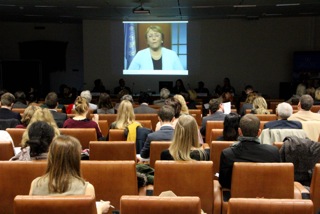 People like former UN diplomat Michael Platzer and his team, who, after seeing It’s a Girl, organized a one-day symposium at the UN in Vienna on fighting femicide (gendercide), where ambassadors, social scientists, NGO representatives, statisticians, lawyers and feminist activists had the opportunity to speak about gendercide, explain its meaning and causes, and present examples of best practice in fighting gendercide. The symposium culminated with the release of the Vienna Declaration on Femicide, a document urging UN member states, UN organizations and civil society to join forces and take responsibility to put an end to gendercide. The declaration was signed by the participants of the symposium as well as by Austria, Slovenia, the Philippines and Norway and plans are underway to bring it to the UN Commission on the Status of Women this March!
People like former UN diplomat Michael Platzer and his team, who, after seeing It’s a Girl, organized a one-day symposium at the UN in Vienna on fighting femicide (gendercide), where ambassadors, social scientists, NGO representatives, statisticians, lawyers and feminist activists had the opportunity to speak about gendercide, explain its meaning and causes, and present examples of best practice in fighting gendercide. The symposium culminated with the release of the Vienna Declaration on Femicide, a document urging UN member states, UN organizations and civil society to join forces and take responsibility to put an end to gendercide. The declaration was signed by the participants of the symposium as well as by Austria, Slovenia, the Philippines and Norway and plans are underway to bring it to the UN Commission on the Status of Women this March!
And people like Omékongo Dibinga – a rapper, trilingual poet, CNN contributor, motivational speaker, TV Talk Show Host and the Director of UPstander International who, inspired by the It’s a Girl trailer, decided to lend his voice to the cause by 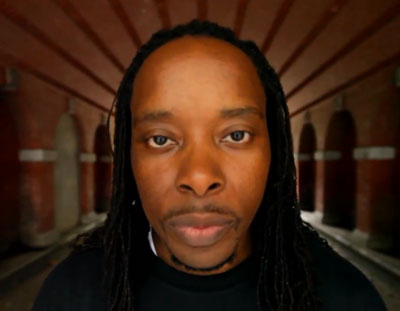 writing and recording a hip-hop song. Omékongo captured so well the inner conflict so many of us experience when learning about gendercide, that we decided to produce a music video of his song. We are so excited to be the first to share with you the It’s a Girl music video! Please take a minute right now to watch it and share with your friends.
writing and recording a hip-hop song. Omékongo captured so well the inner conflict so many of us experience when learning about gendercide, that we decided to produce a music video of his song. We are so excited to be the first to share with you the It’s a Girl music video! Please take a minute right now to watch it and share with your friends.
Deesh, Michael, Omékongo and all of you who have joined them in the fight to end gendercide are the reason we made It’s a Girl. You have taken this film and run with it, and together, we are putting gendercide front and center on the world stage of human rights concerns.
As we embark on another year of fighting for the end of gendercide, we wanted to say thank you! Thank you on behalf of the millions of women in India and China who need our voice. Thank you on behalf of millions of girls, yet to be born, who will draw their first breath, and go on to fulfill their destiny because of you. We look forward to 2013 being a year that history will look back upon as a turning point in the battle to restore value and equality to the women of India and China.
It’s a Girl Inspires Music Video by Hip Hop Artist Omékongo Dibinga
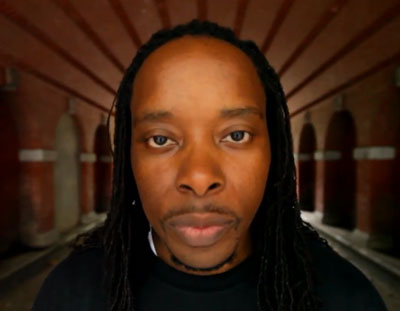 We are so excited to be the first to share with you the It’s a Girl music video!
We are so excited to be the first to share with you the It’s a Girl music video!
After seeing just the film trailer, Omékongo Dibinga was inspired to lend his voice to help end gendercide. Omekongo – a rapper, trilingual poet, CNN contributor, motivational speaker and the Director of UPstander International – put pen to paper and wrote this amazing hip-hop song.
“I wrote this song because hip-hop is a global force. Yet too many hip-hop artists do not use their powerful skills and influence to speak on issues like these. I want to use my talent to make a positive change in this world.” – Omékongo.
After writing the lyrics, Dibinga shared them with the film’s director, Evan Grae Davis. “When Omékongo approached us with the lyrics to this rap song he had written, I was deeply moved with how he expressed his heart for the victims of gendercide around the world. I’m sure having two daughters of his own makes it personal. His words reflect a deep passion against the injustice of gendercide in a way we wanted to share, so we asked him if he would record the song!” Davis said.
Omékongo recruited Lindsay Samakow, a talented debut vocal artist, to provide the backdrop as he recorded his song titled after the film, “It’s a Girl.”
“I was so inspired when I heard the song for the first time,” says Davis, “that I wanted to produce the music video to bring it alive in a new dimension. We filmed Omékongo performing the song on the streets of New York City and in Central park with his two beautiful daughters and niece. We added in several clips from the documentary, and now have a music video that truly captures his heart for justice.” Davis concluded, “The result is a haunting and compelling expression of one man’s reaction to one of the greatest human rights issues of our time. If more people responded as Omékongo has, we could truly change the world!”
The music video is available on YouTube, and the song is available on iTunes. A press release is also available.
There is Heart in Hope
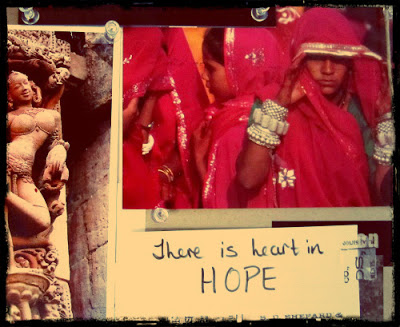 I have written about this issue so many times on my blog…but every single time I start…I am at a loss for words. How do I write about this? How can I say what I want to say without using so many numbers and statistics. Over 50 million (yes, million!!), 70 million or 100 million girls and women missing?? No-one really knows the numbers. I mean, there is no real way to calculate female fetuses and girls that are killed in the womb through sex elective abortions. There is no way to tell how many baby girls are suffocated to death…it’s all very hidden so it’s impossible to get a real number. But when you see a very skewed gender ratio in India and China…you start to get a clearer picture of the magnitude of the gendercide that is happening right now halfway across the world. But really, it’s only a heartbeat away…because these girls are our daughters…these women are our sisters.
I have written about this issue so many times on my blog…but every single time I start…I am at a loss for words. How do I write about this? How can I say what I want to say without using so many numbers and statistics. Over 50 million (yes, million!!), 70 million or 100 million girls and women missing?? No-one really knows the numbers. I mean, there is no real way to calculate female fetuses and girls that are killed in the womb through sex elective abortions. There is no way to tell how many baby girls are suffocated to death…it’s all very hidden so it’s impossible to get a real number. But when you see a very skewed gender ratio in India and China…you start to get a clearer picture of the magnitude of the gendercide that is happening right now halfway across the world. But really, it’s only a heartbeat away…because these girls are our daughters…these women are our sisters.
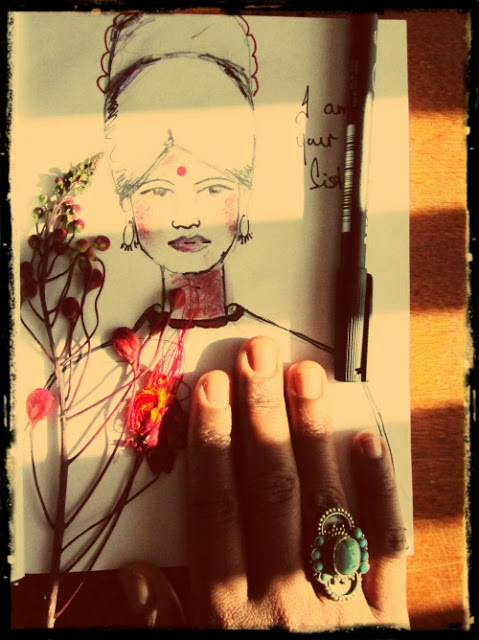 This is what’s true. When we were in Vancouver a few months ago, I went to see a special screening of the movie It’s a Girl. Afterwards..I plunged into a dark place. I cried and cursed and ranted on and on. Then I cried + cursed some more. It broke my heart. And it pissed me off. And in between all of that…I was ever so thankful that Tara was not born in a culture and society were this was permitted. But then something happened…a shift in me, in my heart + mind. There are millions of Taras that are not permitted to be born there…that are never allowed this most basic right…the right to live!!! And I realised that it is not enough, not enough, not enough…for me to be grateful that my daughter was not born there.
This is what’s true. When we were in Vancouver a few months ago, I went to see a special screening of the movie It’s a Girl. Afterwards..I plunged into a dark place. I cried and cursed and ranted on and on. Then I cried + cursed some more. It broke my heart. And it pissed me off. And in between all of that…I was ever so thankful that Tara was not born in a culture and society were this was permitted. But then something happened…a shift in me, in my heart + mind. There are millions of Taras that are not permitted to be born there…that are never allowed this most basic right…the right to live!!! And I realised that it is not enough, not enough, not enough…for me to be grateful that my daughter was not born there.
Rita Banerji, who is doing the heart wrenching work of addressing this atrocity, has been trying to get heard at the United Nations. And…it’s finally happened!!! Currently the U.N. does not recognise gender based genocide as a human right violation. Rita is trying to change that. She is going to present this genocide at a U.N. conference in Vienna and she needs your help!! Can you please sign this petition right here to say that women’s rights are human rights!! Because there is strength in our voices, there is courage in our actions and there is heart in hope.
 Originally posted on Soraya Nulliah’s personal blog at http://sorayanulliah.blogspot.com/
Originally posted on Soraya Nulliah’s personal blog at http://sorayanulliah.blogspot.com/
Soraya Nulliah is an Indo-Canadian mixed media artist who currently lives in the U.S. with her husband and baby girl. She is also a writer, budding photographer and creative soul who believes, with all her heart, that our stories deeply matter. Our stories of hope, of pain, of joy, of promise; they all connect us to each other and to our deepest selves.
The views expressed by guest contributors to the “It’s a Girl” blog represent the opinion of the individual author who contributes the content and should not be interpreted as being endorsed or approved by Shadowline Films. We feature these contributions to foster dialogue and exchange on gendercide and invite our readership to join the discussion.
